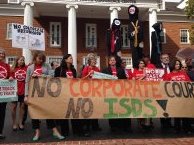Articles in English
European Commission | 1-Feb-2021
The EU and Canada adopted four decisions putting in place the Investment Court System provisions agreed in the EU-Canada Comprehensive Economic and Trade Agreement (CETA).
Business Today | 1-Feb-2021
For a government struggling to find revenue to boost a COVID-19 battered economy, options of appeal against the arbitration award are limited and it may not have the financial bandwidth for such a payout.

Public Citizen | 28-Jan-2021
ISDS tribunals have ordered governments to pay corporations more than $989 million in compensation after ISDS attacks launched just under U.S. agreements.
Lexology | 28-Jan-2021
Last year saw a wave of cases against Latin American states, driven in particular, but not exclusively, by a large number of claims filed against Peru, Colombia and Mexico. This wave is likely to continue in 2021.
keywords:
investor-state disputes | ISDS ,
Latin America
The BVI Beacon | 27-Jan-2021
A Virgin Islands court has frozen shares in two hotels belonging to Pakistan’s national airline to enforce a $6 billion award levied through the World Bank’s ICSID.
The Hindu | 27-Jan-2021
UK-based Cairn Energy Plc has threatened that it may be forced to begin attaching Indian assets including bank accounts in different world capitals, unless the government resolves the issue.
The Conversation | 26-Jan-2021
The owner of Keystone XL — TC Energy (previously TransCanada) — used NAFTA to launch a US$15 billion lawsuit in 2016 after President Barack Obama cancelled the project.
EJIL: Talk! | 26-Jan-2021
One of the most noticeable facts in recent ISDS is the spectacular inflation of compensation awarded to investors. The most important factor is probably the widespread use by tribunals of the DCF (discounted cash flows) valuation method.
keywords:
investor-state disputes | ISDS
Live Mint | 25-Jan-2021
Investors have written to the Indian government as well as the governments of the US and UK seeking adherence to the award of a tribunal at the Permanent Court of Arbitration in The Hague
Memesita | 22-Jan-2021
Nuevo Pudahuel had asked the Ministry of Public Works to extend the term of the concession contract as a result of the pandemic, but the MOP was closed to changes in the contract.


